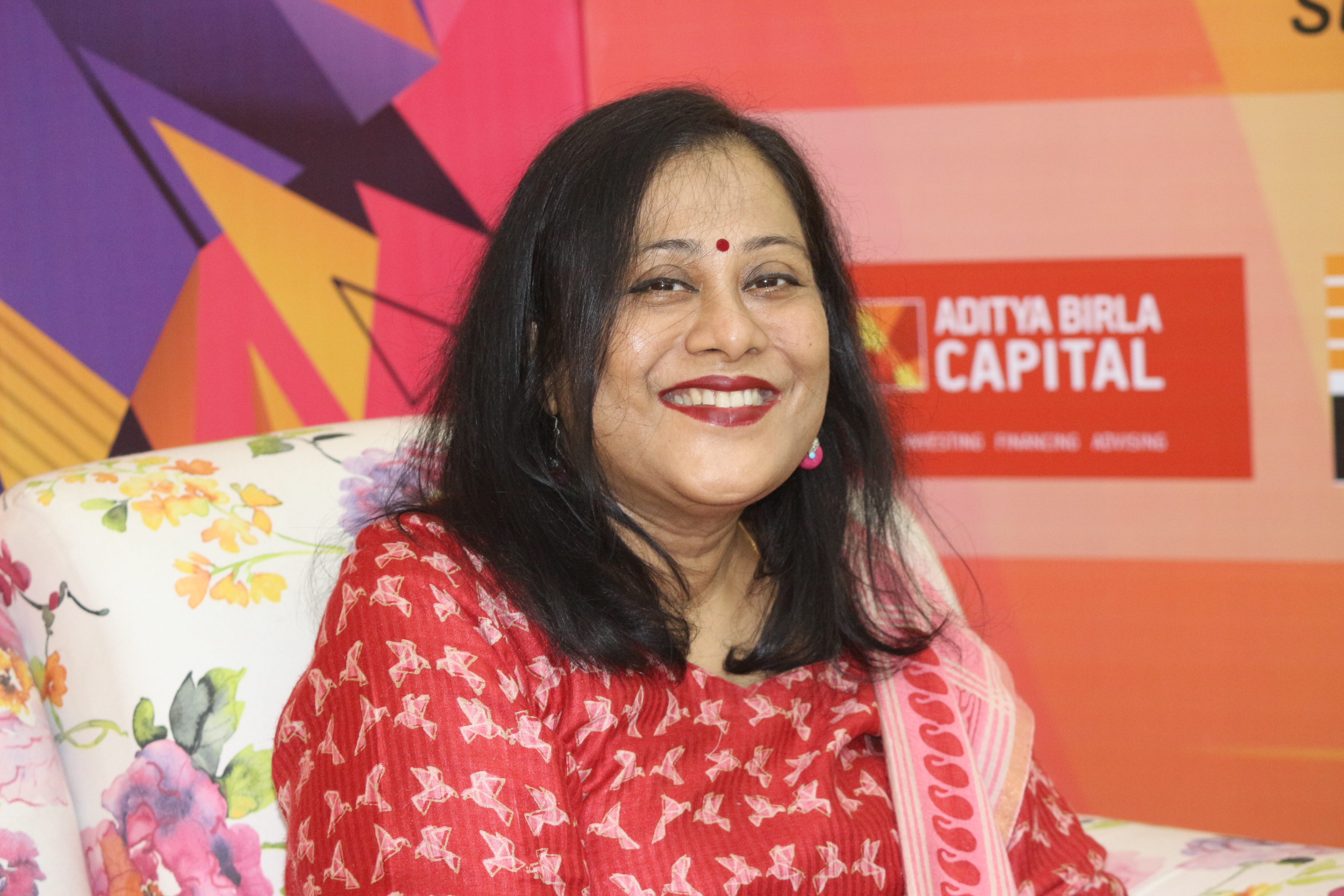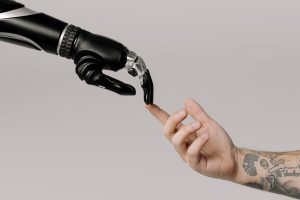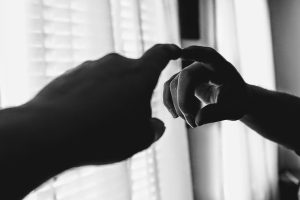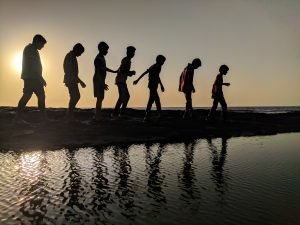Dr. Sruti Mahopatra (SM) is the Founder of Swabhimaan and a pillar of the Indian disability movement. At Success & ABILITY, we had the privilege to listen to her tell her story. Now you can hear it too! Head over to our latest interview now.
Interviewed by Yashasvini Rajeshwar (YR), Deputy Editor, Success & ABILITY
YR:
Good evening everyone. My name is Yashasvini and we are here for the next video interview for Success & ABILITY, the magazine from Ability Foundation. We have with us today Dr. Sruti Mohapatra, the founder and head of Swabhimaan, a registered nonprofit and Odisha’s first cross-disability organisation. Dr. Sruti & Swabhimaan have been a part of the disability rights movement through many many milestones, including the amendment of the RTE Act, census enumeration of the disabled, accessible elections in India and the RPWD Act of 2016. Swabhimaan focuses on creating the rights-based environment in India for people with disabilities. Dr. Sruti has been the recipient of numerous awards including the CavinKare Ability Special Recognition Award in 2018. And also recently, the Nari Shakthi Puraskar 2021 from the President of India on Women’s Day – March 8th. Thank you so much for joining us today, Ma’am, and congratulations on the recognition.
SM:
Thank you. Thank you, Yashasvini. Namaskar to all.
YR:
My first question to you, Ma’am, is about your journey. So much of the work that you have done has been based on the value of ‘nothing for us without us’. We’d love to hear your thoughts on the journey so far and what the future holds for you and the sector.
SM:
Sure, Yashasvini. I’m quite happy to be sharing with you some moments from this journey. Disability… When I entered the movement… I’m taking you back to the year 1987 when I met with the accident and became disabled. I moved from one side of the table to the other side. And suddenly I realised that I was not an acceptable human being anymore. My only identity remained a wheelchair or discussions about hospital or rehabilitation and such kind of things which are not very acceptable to me. So I started to devour books [as] I love to read. So my first interest even in the hospital when I was getting rehabilitated in CMCH Vellore was can you give me books? I want to know what is my condition. What happened to me?. And my sister who just got married and moved to the US she sent me [because] we did not have internet, computers also you can say, but largely I built up my knowledge by reading a lot of magazines and books that my sister sent me from the US. And then in 1996 in India, the disabled people’s international India chapter was started in Siliguri. And that’s when I directly got involved with the disability movement. Prior to it, it had been a brief introduction with Javed. I met him first and that’s how the involvement with the protest march for the PWD Act 1995 to which we were involved you can say writing letters and those kinds of things. But the actual involvement of understanding my rights and fighting for my rights – it all started with participating in various international meetings, workshops, training programmes. And I have very fond memories of the early years. When the three of us – Jayshree Raveendran, myself and Javed Abidi – we used to sit and, over dinner and late into the night, talk about the sector. Talk aboutnot the sector, you know, per se, but our rights. We’re all educated and we are all taxpayers if you’re being treated so badly… And there were two other people also, who were there with us very briefly. One was Anuradha Mohit and earlier was Mr. Vikram Dutt also and there were many other people. So the biggest problem you know, and the three of us, you can practically say with Anuradha Mohit, actually, it began, you know, what you call the cross-disability movement and bringing people together and thinking about the big things like the census and accessibility in schools and accessibility in colleges and universities because that was my passion area. I had been a topper and gold medalist in the university but after my accident when I went back to my M.Phil and PhD, I suffered a lot [and] faced many barriers. So the situation then, Yashasvini, was there was no visibility of disability, number one. Number two, all issues of disability were confined to one department and this department in most of the states was in the women in Child Development Department. Disability was parked there. It did not get priority and WCD department in itself had a huge mandate. It had children and they’re also taking care of drug addiction and rehabilitation, the elderly, transgenders, everything. So disability was no priority for anyone.
So today when you ask me to look back, I can say somewhere I have played a role in making disability visible. Number two, somewhere all of us who were there in the early days of the movement, we have been able to make people think about disability not as something which is parked in WCD department, not as a group of people who need rehabilitation and assistive devices, but as human beings who need to be educated, who have other needs like travelling, they need to go in a bus, need to go in a train. If there is a park, if there is a recreation, a cinema hall, they need to be part of it. If there’s a church, a mosque or a temple, they have every right to go there. And I also feel happy that when you look at this year when we are talking about the Sustainable Development Goals and the tagline is “leave no one behind” and in 2030 they’re looking at disaggregated data in a huge number. Somewhere I have played and led the movement… we have been in the forefront. We’ve led the movements so that India today has strong rights-based laws and is looking at inclusion in every aspect. So that’s a good thing. But I will also tell you about the other aspect. In 2018, we had done an extensive campaign. The 1995 law I personally feel could not achieve what it could have because the law did not reach people. So unless the people for whom it is meant, their family members, the people who work for NGOs, the non-profits, all of them read and understand the law, how will they use the law?
So in 2016 we in Odisha have a network the Odisha State Disability Network. We all got together [and] we decided people must read this law. They must know the law. So a two-pronged approach. One is people with disabilities must know the law and second, [those] who provided them services, [those] who are decision makers, they must know the law. So in 2018, we did an extensive campaign, and in a 45-day period, we reached about five lakh people covering all districts of Odisha [and] going to the remote blocks and villages.
But what is the problem? So why is the UNESCO report “N for Nose” giving us such a dismal picture? Why the disability and development report of the United Nations – the first after the the SDGs came out -giving such a dismal picture of disability in India? When we have so many strong laws – we have the Right to Education amended Act. Now we have the National Education Policy, we have an Accessible India campaign and the RPWD Act. So what is the issue?
When we dig deeper now I see [that] now the goal is… What all of us have to do is awareness, awareness, awareness. Number one is awareness. We have to take this law in different formats. If you come to Odisha or I go to Bangalore, I don’t know Kannada. So you asked me to give my matriculation exam and then you tell me “you’ve failed.” I haven’t failed. I did not know the language to write it. If you come to Odisha, you will suffer the same fate. So we have to change this. We have to make the law available to the illiterate in [an] easy format with pictures so that it can also be read by the autistic and the intellectually disabled. We have to provide a lot of signages, pictures, Braille, and use the folk art forms. You know what we did in Odisha? When we started talking about the law in the first two districts, we found that after sometime [in] five minutes, people were losing interest. Immediately we reconvened. We brought in all the folk art forms of Odisha. Every district of Odisha has a unique folk art form. So we use that folk art form called Palla, Chdiyani dance, and used the folk art forms to dance the Act, to mime the Act, to sing the Act and we found that people stayed there for a long time listening to the Act. And now the government is doing it in all its camps, using the folk art forms.
And you know, local markets are a lovely place where you can just paint a lot of this Act so we took what Odisha’s most traditional art form, which is internationally famous, the Raghurajpur art form, miniature art. We took that and we made our posters using that art form, colourful, variety and people of Odisha could relate to it. So these are innovative mechanisms all of us have to use in every state of India to reach the last village where the last Person with Disability lives and they understand that. That’s one thing. Second, I have seen in the United States or Europe, their universities have been the fulcrums of change.
So when academia gets involved… In India, if you look at the research, if you look at publications it is extremely weak when it comes to disability. If you look at the television programmes and radio programmes you find more number of programmes showing how heroic we are, how the society has been villainous to ourselves, how evil they have been. But you do find an interesting debate on the budget and how much was allocated for disability. You don’t find an interesting television programme on schools and colleges who are developing their special resource centres or about resource teachers for the disabled. So those kinds of academic discussions are what we need. Somehow we have to reach the Ministry of Education, the Departments of Education in every state, and we have to request and sit and negotiate with UGC that for next three years at least there must be a campaign… You know, we have the Accessibility India campaign. So let us have a campaign where every college [and] every university that is getting funding, they must ensure that every PhD, every MPhil dissertation, every graduate student internship, everything is focused around disability – inclusion in sports or women and disability, on violence, any department which is studying gender… Gender Studies departments – that year [or] for the next three years focusing only on issues of women with disabilities; Sociology departments focusing on the status of people with disabilities in the society. We do these kind of thing and the whole of India – the libraries, the browsers, the web, the e-content, it gets rich. You have lots of information, lots of authentic studies on disability. When academia is involved, when there is cerebral involvement, suddenly you will find there is a growing interest.
Suddenly you will find a lot of availability of material on disability. That coupled with awareness will definitely help because… I tell this to everybody. These are amazing times. The international governments, the national government, they’re all in sync. They all are looking at disability from the development perspective. And all are looking at it from a human rights perspective. Today, if people with disabilities miss the bus, they’re never going to board it again. So we have to make the best of the opportunity. We have to make sure if we have a good law, everybody knows the law. We have to make sure that a government officer sitting in a sarpanch office in a village understands that when he’s giving a disability pension, it’s not doing out of charity. He is doing it because hundreds of years of discrimination has reduced opportunities for this Person with Disability. So all that he is doing by giving this disability pension is levelling the playing field for that disabled person. Once this gets into our psyche We’re not doing favours. We’re not positively discriminating against the disabled. What we are doing is [after] hundreds of years of discrimination, we are levelling the playing field and giving them opportunities.
YR:
Thank you so much, Ma’am. That was about 15-minute summary of so many years of history in the disability sector. There’s so much to learn from the journey that you and the others who’ve been at the forefront have been on. My last question for you this evening has to do with something closer to home for us. The CavinKare Ability awards have been a feature of the sector for 20 years now and you were the recipient of the Special Recognition Award in 2018. I just wanted your thoughts on the initiative and how it ties into the larger sector and its importance.
SM:
When I attended the CavinKare awards, I knew about it and I’ve been involved with it. So it was not a new place or a new award that I was coming to. But I what I really admire about Jayshree and her vision is the involvement of large number of people who are not disabled [and] who are not working in the disability sector. So that is what all of us should be doing. Involve every section of the society in your activity, that disability becomes a very normal functional thing in everybody’s life, in everybody’s work area. Recognition is important. You see, [after] almost 27 years of activism here in India, this is the first time… I have won a lot of awards. Almost close to maybe 75 including CNN-IBN and some very good literary awards here in the state of Odisha. But national recognition came my way only after a long, long period of almost 27 years of active work. It gave me joy. Why joy? Because here there is finally a recognition that yes, somebody has been toiling, somebody has been working and here I did not fill up a form or I never applied so when your work starts speaking for you it is definitely a moment of glory. But more important than that for me was the Women and Child Development Ministry coming forward with the award. Getting the award from my department is okay because my department deals with disability. This is what all of us in the sector have been saying. All ministries or departments should recognise disability and what Ability Foundation’s award has done is it has given people joy. It has given people motivation. It has given people confidence. The people who see it, it has given them confidence that yes, if I toil hard, if I do something which is good for me, if I excel in my work, if I work for others, and someday I will also be on that dais receiving an award. And glamour that Ability Foundation has always attached to the awards ceremony in terms of classical performance or bringing in artists from different fields. That is what has really made this award very, very special for us.
YR
Thank you so much. Wonderful speaking with you this evening and we are very, very glad to have you join us on the journey that the Ability foundation is on [and] for us to join you. After all, we are in this together. Thank you so much, Ma’am. Take care.
SM
Bye-bye. Thank you.








